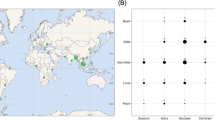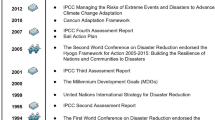Abstract
Climate variability and change are directly challenging the viability and sustainability of social–ecological systems. This is particularly true for water resources. Effective water governance is at the heart of alleviating water challenges and is thus considered crucial for building adaptive capacity to cope with future uncertainty and impacts from climate change. Despite advances in the conceptualisation of adaptive capacity, there are few empirical examples that look systematically across cases to identify how to implement measures and actions that build and mobilise adaptive capacity. This paper contributes to the understanding of adaptive capacity to climate stress by analysing the bridges and barriers to adaptation across water governance and management regimes in the case of the Canton Valais, Switzerland and the state of Georgia, USA. We find that while there is no single way to build and mobilise adaptive capacity across different scales of governance, the analysis points to a set of common bridges and barriers for building adaptive capacity to a variety of climatic events. Common bridges include trust and actor relationships, regional collaboration, leadership, and regulatory and legislative aspects. Common barriers include political, regulatory and legislative, and perception and cognitive aspects.

Similar content being viewed by others
References
Adger WN, Arnell NW, Tompkins E (2005) Successful adaptation to climate change across scales. Glob Environ Chang 15:77–86. doi:10.1016/j.gloenvcha.2004.12.005
Adger WN, Agrawala S, Mirza MMQ, Conde C, O’Brien K, Pulhin J, Pulwarty R, Smit B, Takahashi K (2007) Assessment of adaptation practices, options, constraints and capacity. In: Parry ML, Canziani OF, Palutikof JP, van der Linden PJ, Hanson CE (eds) Climate change 2007: impacts, adaptation and vulnerability. Contribution of working group II to the fourth assessment report of the intergovernmental panel on climate change. Cambridge University Press, Cambridge
Adger WN, Dessai S, Goulden M, Hulme M, Lorenzoni I, Nellson DR, Naess LO, Wolf J, Wreford A (2009) Are there social limits to adaptation to climate change? Clim Chang 93:335–354. doi:10.1007/s10584-008-9520-z
Adger WN, Brown K, Nelson DR, Berkes F, Eakin H, Folke C, Galvin K, Gunderson L, Goulden M, O’Brien K, Ruitenbeek J, Tompkins EL (2011) Resilience implications of policy responses to climate change. WIREs Clim Chang 2:757–766. doi:10.1002/Wcc.133
Adhikari B, Taylor K (2012) Vulnerability and adaptation to climate change: a review of local actions and national policy response. Clim Dev 4:54–65. doi:10.1080/17565529.2012.664958
Bierbaum R, Smith JB, Lee A, Blair M, Carter L, Chapin FS, Fleming P, Ruffo S, Stults M, McNeeley S, Wasley E, Verduzco L (2012) A comprehensive review of climate adaptation in the United States: more than before, but less than needed. Mitig Adapt Strat Glob Change. doi:10.1007/s11027-012-9423-1
Brooks N, Adger WN (2005) Assessing and enhancing adaptive capacity. In: Lim B, Spanger-Siegfried E (eds) Adaptation policy frameworks for climate change: developing strategies, policies and measures. UNDP-GEF, pp 165–181
Brooks N, Adger WN, Kelly PM (2005) The determinants of vulnerability and adaptive capacity at the national level and the implications for adaptation. Glob Environ Chang 15(2):151–163. doi:10.1016/j.gloenvcha.2004.12.006
Chapin FS, Kofinas GP, Folke C (2009a) Principles of ecosystem stewardship: resilience-based natural resource management in a changing world. Springer, Berlin
Chapin FS, Folke C, Kofinas GP (2009b) A framework for understanding change. In: Chapin FS, Kofinas GP, Folke C (eds) Principles of ecosystem stewardship resilience-based natural resource management in a changing world. Springer, New York
Crabbé P, Robin M (2006) Institutional adaptation of water resource infrastructures to climate change in eastern Ontario. Clim Chang 78:103–133
ECB (2013) Toward resilience: a guide to disaster risk reduction and climate change adaptation. Emergency capacity building project, Available at: http://www.ecbproject.org/downloads/ECB-toward-resilience-Disaster-risk-reduction-Climate-Change-Adaptation-guide-english.pdf
Ekstrom JA, Moser SC, Torn M (2011) Barriers to adaptation: a diagnostic framework, PIER Research Report CEC-500-2011-004. Public Interest Energy Research, Sacramento
Engle NL (2010) Adaptation to extreme droughts in Arizona, Georgia, and South Carolina: evaluating adaptive capacity and innovative planning and management approaches for states and their community water systems. University of Michigan, Ann Arbor
Engle NL (2011) Adaptive capacity and its assessment. Glob Environ Chang 21:647–656. doi:10.1016/j.gloenvcha.2011.01.019
Engle NL, Lemos MC (2010) Unpacking governance: building adaptive capacity to climate change of river basins in Brazil. Glob Environ Chang 20:4–13. doi:10.1016/j.gloenvcha.2009.07.001
Federal Law on the Protection of the Environment (1983) Bundesgesetz über den Umweltschutz (USG), SR 814.01. www.admin.ch/ch/d/sr/c814_01.html, 7 Oct 1983 (Status on 1 Aug 2010)
FOEN (2011) Leben mit Naturgefahren: Ziele und Handlungsschwerpunkte des Bundesamts für Umwelt (BAFU) im Umgang mit Naturgefahren. Federal Office for the Environment: Natural Hazards Prevention Division, Bern
FOEN (2012) Adaptation to climate change in Switzerland—goals, challenges and fields of action. Federal Office for the Environment, Bern
Folke C, Hahn T, Olsson P, Norberg J (2005) Adaptive governance of social-ecological systems. Annu Rev Environ Resour 30:441–473. doi:10.1146/annurev.energy.30.050504.144511
Gaillard JC, Mercer J (2013) From knowledge to action: bridging gaps in disaster risk reduction. Prog Hum Geogr 37:93–114. doi:10.1177/0309132512446717
Garmestani AS, Allen CR, Cabezas H (2009) Panarchy, adaptive management and governance: policy options for building resilience. Neb Law Rev 87:1036–1054
Georgia (2003) Georgia drought management plan. Georgia Department of Natural Resources Board, Available at: http://www.gaepd.org/Files_PDF/gaenviron/drought/drought_mgmtplan_2003.pdf. Accessed 15 Aug 2009
Gupta J, Termeer C, Klostermann J, Meijerink S, Van den Brink M, Jong P, Nooteboom S, Bergsma E (2010) The adaptive capacity wheel: a method to assess the inherent characteristics of institutions to enable the adaptive capacity of society. Environ Sci Policy 13:459–471. doi:10.1016/j.envsci.2010.05.006
Hill M (2011) Characterising adaptive capacity in water governance arrangements in the context of extreme events. In: Leal Filho W (ed) Climate change and the sustainable use of water resource. Springer, Berlin, pp 339–366
Hill M (2013) Climate change and water governance: adaptive capacity in Chile and Switzerland. Springer, Heidelberg
Hill M, Engle NL (2013) Adaptive capacity: tensions across scales. Environ Policy Gov 23:177–192. doi:10.1002/eet.1610
Huntjens P, Pahl-Wostl C, Rihoux B, Schlüter M, Flachner Z, Neto S, Koskova R, Dickens C, Nabide Kiti I (2011) Adaptive water management and policy learning in a changing climate: a formal comparative analysis of eight water management regimes in Europe, Africa and Asia. Environ Policy Gov 21:145–163. doi:10.1002/eet.571
Jewitt G (2002) Can integrated water resources management sustain the provision of ecosystem goods and services? Phys Chem Earth 27:887–895
Matthews JH, Wickel BAJ, Freeman S (2011) Converging currents in climate-relevant conservation: water, infrastructure, and institutions. PLoS Biol 9:e1001159. doi:10.1371/journal.pbio.1001159
Medema W, McIntosh BS, Jeffrey PJ (2008) From premise to practice: a critical assessment of integrated water resources management and adaptive management approaches in the water sector. Ecol Soc 13:29 [online]. http://www.ecologyandsociety.org/vol13/iss22/art29/
Milly PCD, Betancourt J, Falkenmark M, Hirsch RM, Kundzewicz ZW, Lettenmaier DP, Stouffer RJ (2008) Stationarity is dead: whither water management? Science 319:573–574. doi:10.1126/science.1151915
Moser SC. (2008) Resilience in the face of global environmental change. Community and Regional Resilience Initiative (CARRI). Research Report 2, Oak Ridge National Laboratory, Tennessee
Moser S, Eckstrom J (2010) A framework to diagnose barriers to climate change adaptation. Proceedings of National Academy of Sciences of the United States of America www.pnas.org/cgi/doi/10.1073/pnas.1007887107
Nelson DR, Adger WN, Brown K (2007) Adaptation to environmental change: contributions of a resilience framework. Annu Rev Environ Resour 32:395–419. doi:10.1146/annurev.energy.32.051807.090348
Pahl-Wostl C (2007) Requirements for adaptive water management. In: Pahl-Wostl C, Kabat P, Möltgen J (eds) Adaptive and integrated water management. Coping with complexity and uncertainty. Springer, Berlin
Pahl-Wostl C (2009) A conceptual framework for analysing adaptive capacity and multi-level learning processes in resource governance regimes. Glob Environ Chang Human Policy Dimens 19:354–365. doi:10.1016/j.gloenvcha.2009.06.001
Pahl-Wostl C, Kabat P, Möltgen J (2007) Adaptive and integrated water management. Coping with complexity and uncertainty. Springer, Berlin, p 440
Pahl-Wostl C, Sendzimir J, Jeffrey P (2009) Resources management in transition. Ecol Soc 14:46. [online] url: http://www.ecologyandsociety.org/vol14/iss41/art46/
Seng DSC (2013) Tsunami resilience: multi-level institutional arrangements, architectures and system of governance for disaster risk preparedness in Indonesia. Environ Sci Policy 29:57–70. doi:10.1016/j.envsci.2012.12.009
Smit B, Wandel J (2006) Adaptation, adaptive capacity and vulnerability. Glob Environ Chang 16:282–292. doi:10.1016/j.gloenvcha.2006.03.008
Tompkins EL, Lemos MC, Boyd E (2008) A less disastrous disaster: managing response to climate-driven hazards in the Cayman Islands and NE Brazil. Glob Environ Chang 18:736–745
UNDP (1997) Governance for Sustainable Human Development. United Nations Development Programme. Online: http://mirror.undp.org/magnet/policy/
Wright KR; AWWA Water Rights Allocation Committee (1998) Water rights of the eastern United States. American Water Works Association, Denver
Acknowledgments
The authors would like to acknowledge all those who took the time to be interviewed for this research and those who were of great help in setting up successful field trips to the case areas. The work presented from Switzerland was supported by the ACQWA project, coordinated by the University of Geneva under EC contract 212250, and the US work was supported by the Dan David Prize Fellowship and the University of Michigan.
Author information
Authors and Affiliations
Corresponding author
Electronic supplementary material
Below is the link to the electronic supplementary material.
Rights and permissions
About this article
Cite this article
Hill Clarvis, M., Engle, N.L. Adaptive capacity of water governance arrangements: a comparative study of barriers and opportunities in Swiss and US states. Reg Environ Change 15, 517–527 (2015). https://doi.org/10.1007/s10113-013-0547-y
Received:
Accepted:
Published:
Issue Date:
DOI: https://doi.org/10.1007/s10113-013-0547-y




